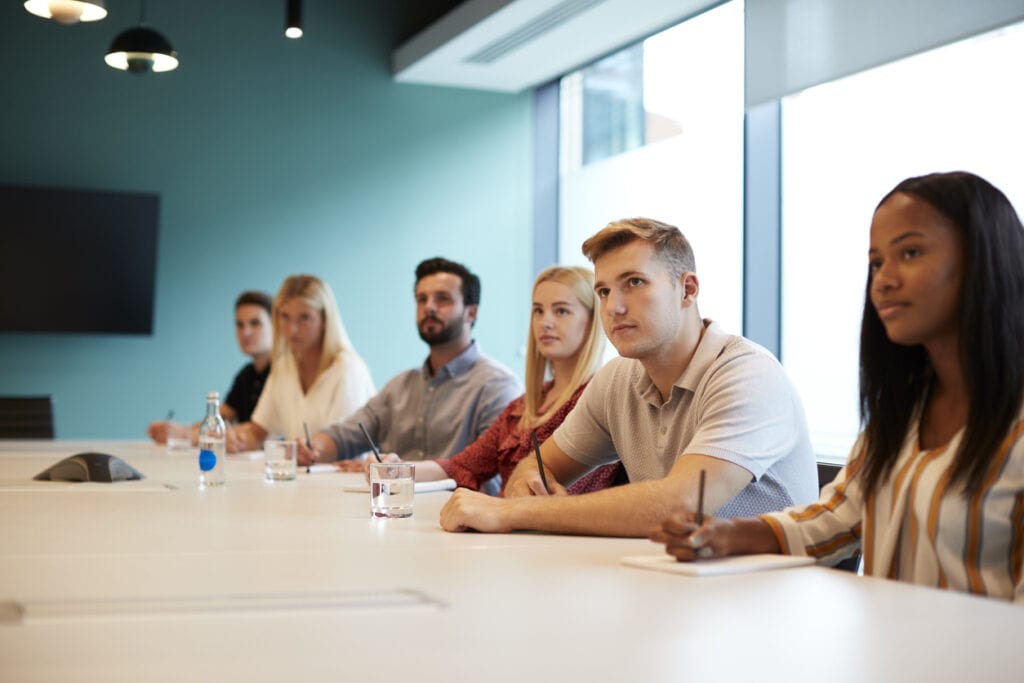Group interviews and assessment: What to expect and how to prepare
After multiple applications, you finally receive an interview offer, but it’s not the usual setup. Instead, you discover it’s a group interview. Although this can feel daunting, there are several benefits for the company hiring.
To begin with, group interviews are a time saver. Rather than seeing one interviewee per hour, the hiring manager can see five. And it goes further than just time-saving: group interviews are a great way to compare potential candidates and assess how they perform under pressure and work in a group.
The good news is, a group interview may mean there’s more than one position available and, with the right preparation, it’s perfectly possible to ace it. To help, we’ve laid out what you can expect and how you can prepare.
Quick links:
- What is a group interview?
- Benefits of group interviews
- What to expect in a group interview
- How to prepare for a group interview
- How to stand out in a group interview
What is a group interview?
As the name suggests, a group interview is an initial meeting that consists of one or two interviewers and several interviewees. This sort of interview can be encountered at many differing hiring levels, from seasonal retail work to executive roles.
Types of group interviews
Group interviews can be split into a few categories:
- Panel Interview: Panel interviews involve a candidate being interviewed by two or more interviewers, with varying levels of seniority and relationship to the hiring position.
- Group project interview: Group project interviews involve multiple candidates working alongside each other to complete a given task. It allows an employer to assess team-building, communication and collaboration skills.
- Group candidate interview: A group candidate interview is a mix between a panel interview and a group project interview. Giving the interviewer the opportunity to interview multiple candidates simultaneously.

Benefits of group interviews
Group interviews come with several benefits for the employer that can be extended to the interviewee.
Firstly, group interviews are more time-efficient than individual interviews, particularly during the early stages of the hiring process when candidates haven’t been narrowed down. As an extension of this, the process is also more cost-effective for businesses. When the long list hasn’t been shortened, interviewing individual candidates can be costly, eating up valuable resource for senior members of the team.
A group interview allows the hiring company to assess multiple candidates in one go, before moving on to more in-depth interviews for select candidates.
What to expect in a group interview
The simulation or exercise section is often the part that candidates are most apprehensive about. It will involve some kind of group activity that will be assessed by the hiring team.
While daunting, this is a chance for the employers to put potential candidates in a live situation to see how they work as a team or how they would handle potential conflict. Here’s what you could expect:
Group discussions
You might be asked to discuss a topic or come up with a solution to a problem along with the other candidates. Teamwork and communication are the most important qualities that interviewers are looking for in this type of activity, so be sure to brush up on these skills.
Group exercises
Many group interviews will have exercises that aren’t necessarily related to the role. This could involve being split into teams and building a house of cards or writing a short story. The overall result isn’t important; what matters is how well you work together. You’ll want to get involved and make suggestions, but try to avoid designating yourself team leader. These exercises are designed to see how you’ll fit in with the existing workforce, not how you can smash the competition.
Roleplay
In many group interviews, you may be given scenarios and asked to respond to how you would if you were to find yourself in that situation at work. These are particularly common in interviews for customer-facing or supervisory positions.
You’re not being tested on your performance skills, so don’t act up to the crowd; just act natural. As much as you can, get into character and respond appropriately.
Take your time to consider your answers, and don’t feel obligated to rush answers just because you have an audience. The interviewer will be assessing your judgement and evaluating if you can resolve issues at hand.
Common group interview questions
During a group interview, questions will differ from the specific questions you would typically be asked during an individual interview. Typically, they focus more on collaboration, instead of personal achievements.
These questions include:
- How would you handle this group project if there’s a disagreement among team members?
- What are your strengths and weaknesses when working as part of a team?
- Describe a time you successfully worked with a diverse group to achieve a common goal.

How to prepare for a group interview
As with any interview, the more prepared you are, the better you’ll feel on the day. Before your group interview, consider the following:
Research the company
Organisations will expect candidates to have done their research, so go in with knowledge of the company. Have an idea of who their main customers and competitors are, as well as being up-to-date with any industry news and recent developments.
Read the job description
The job description is like a handy set of clues for the interview process. If your role is to be customer-facing, then they’ll expect confidence and a personable nature. If the role is heavily tech-focused, then you can expect questions on your expertise in the field. Go through the job description and prepare to illustrate how you tick every one of their boxes.
Consider your previous roles
It’s always a good idea to have examples on hand of when you performed well in a previous position. It’s also wise to prepare an example of when something went wrong and how you dealt with it.
Create an icebreaker
In a group interview setting, there will often be an ice-breaker section at the beginning. This could be where you introduce yourself to the rest of the group and outline your previous experience, it could take the format of “three interesting facts about yourself”, or it could be to say what you had for breakfast! Candidates are sometimes thrown by this, so prepare some words about yourself just in case.
How to stand out in a group interview
Be prepared and punctual
A group interview usually begins before candidates have even entered the room. Arriving early (as well as showing that you’re punctual and considerate) gives you the chance to interact in an informal setting with your fellow candidates. A good rule of thumb is to treat your fellow candidates like potential colleagues rather than the competition. Needlessly disagreeing and belittling the other candidates certainly won’t win you any favours! Take the time to get to know the people around you before you go in.
Answer questions efficiently
Make a point to be the first one to answer some of the interview questions that are put to the group. You don’t have to attempt to answer every question first; this could make you appear pushy and work against you, but don’t always politely wait until the rest of the room has had their say before you pipe up. By answering first occasionally, you’ll come across as confident and knowledgeable and will stand out in the interviewer’s mind.
Support fellow interviewers
If one of your fellow candidates answers a question well, feel free to agree or be supportive of their answer. You’ll show that you’re a team player, something that’s very important to a hiring manager.
Most people go into a group interview session knowing they need to speak to make an impression; far too few realise they also need to listen. Steamrolling others’ points won’t win you any favours. Listen, actively listen, and aim to refer back to previous points when you can.
Remember your body language
Body language can make a world of difference, especially in a situation like this. Sit up straight and make eye contact when the interviewer is talking. Failure to do this could make you appear listless and uninterested, and, let’s face it, that’s certainly not a quality at the top of any interviewer’s list. Remember that communication is more than what you say.
Showcase your skills
Group interviews offer a great opportunity to showcase your skills. Skills such as listening, talking, presenting and supporting showcase soft skills that can otherwise be difficult to demonstrate in an individual interview.
By following the advice listed above, you’ll be able to ace the group interview stage of a job application before taking the next step during your individual interview.
Click here for the latest news and features from SEFE or visit our homepage to find out about our latest career opportunities.
The views, opinions and positions expressed within this article are those of our third-party content providers alone and do not represent those of SEFE. The accuracy, completeness and validity of any statements made within this article are not guaranteed. SEFE accepts no liability for any errors, omissions or representations.







